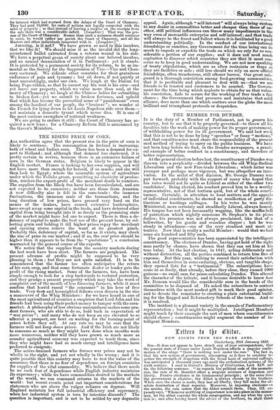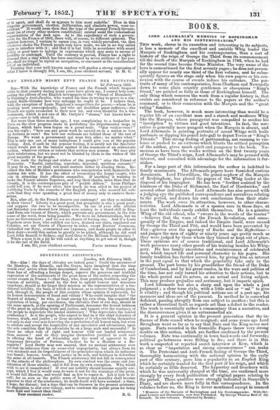Itttero to tht Calor, NEW LIGHTS FROM THE DARK AGES.
Canterbury, 29th January 1852. Sm—It does not appear to have struck any of your correspondents, that the present state of France under Louis Napoleon affords a singular confir- mation of the adage " there is nothing new under the sun." The fact is, that his new system of government, attempting as it does to combine to- gether the strength of despotism with the broad basis of universal suffrage, was anticipated a thousand years ago amid the ecclesiastical systems of the sixth century. I read in Guizot's History of Civilization, Lect. XIV. sub fin. the following sentence. "As regards the political code of the monaste- ries, the rule of St. Benedict offers a singular mixture of despotism and liberty. Passive obedience is its fundamental principle ; at the same time the government is elective ; the Abbot is always chosen by the brothers. When once the choice is made, they lose all liberty, they fall under the ab- solute domination of their superior. Moreover, in imposing obedience on the monks, the rule orders that the Abbot consult them. Chap. III. ex- pressly says, Whenever anything of importance is to take place in the monas- tery, let the abbot convoke the whole congregation, and say what the ques- tion is ; and after having heard the advice of the brothers, he shall think of it apart, and shall de as appears to him most suitable.' Thus in this singular government, election, deliberation, and absolute power, were co- existent." It would seem then that the type of the present French Govern- ment (as of every other modern constitution) existed amid the ecclesiastical organizations of the dark ages. As to the expediency of such a govern- ment for the France of 1852, there will, of course, be different opinions. The opinion however, I venture to assure you, is very widely prevalent, viz. that whatever choice the French people may have made, we are in no way called upon to interfere with it ; and that it is but little in accordance with sound policy or good taste to indulge in expressions which may seem to savour of hostility or contempt. Until the contrary is proved, France has a right to demand that a step which has been sanctioned by seven millions of her peo- ple, shall no longer be styled an usurpation, or canvassed as the unauthorized act of an individual.
Trusting that your well-known candour will pardon a strong expression of what I know is strongly felt, I am, Sir, your obedient servant, G. H. C.



























 Previous page
Previous page